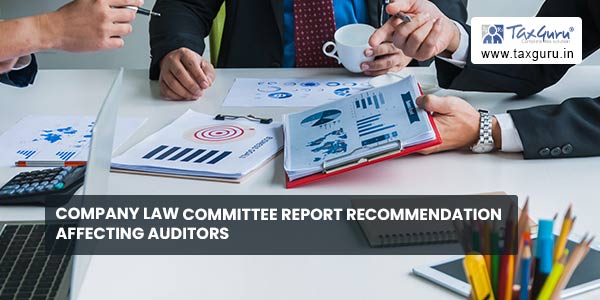The Ministry of Corporate Affairs (MCA) has formed the Company Law Committee (CLC) to make recommendations to the government on reforms that will improve the ease of doing business in India and simplify the Companies Act 2013. There were numerous recommendations in the report on the overall structure of the Act; however, in this post, we will focus on specific recommendations affecting Company Auditors.
1. Currently, the National Financial Reporting Agency (NFRA) has the authority to take action against a member or firm of chartered accountants for professional or other misconduct. Professional or other misconduct is not defined in the Companies Act 2013 and is referred to in the Chartered Accountants Act, 1949. As a result, the NFRA lacks the authority to take action against offences that do not fit under the definition of professional or other misconduct as established under the Chartered Accountants Act, 1949. Therefore, the Committee recommended to empower NFRA in order to take action against professional or other misconduct under the Companies Act.
2. Nearly 11,000 auditors had not filed Form NFRA 2 (an annual return to be filed by auditors under Rule 5 of the NFRA Rules, 2018). As a result, a recommendation was made to allow NFRA to take legal action if its instructions are not followed or appealed.

3. The Committee recommended that certain types of companies, where public interest is not involved, should be allowed to avail non-audit services, which are now forbidden under Section 144. However, the Committee also opined that, non-audit services of any sort, directly or indirectly, should not be supplied by the statutory auditors to the firm or its holding, subsidiary, or associate company in companies wherever public interest is involved (ies).
4. A resigning auditor must assure shareholders and other stakeholders that nothing in the company’s records needs to be brought to their attention, and that her resignation is an independent decision. Before resigning, the auditor must provide full disclosures, including whether the resignation is due to non-cooperation from the auditee company, fraud or severe non-compliance, or funds diversion. If such information comes to light after an auditor’s resignation but is not stated in the resignation statement, appropriate action against the resigning auditor may be taken.
5. The Committee also suggested that certain larger companies be subjected to mandatory joint audits under the Companies Act of 2013.
6. Since a holding company has a significant investment in its subsidiary companies, the Committee felt that the auditor of holding company should be assured of fairness of each subsidiary company’s audit by the respective auditors for adequate financial control. In addition, if necessary, the holding company’s auditor may be authorised to independently verify the accounts or part of accounts of any subsidiary company.
7. The Committee observed that whenever auditors’ reports make reservations or adverse remarks about a company’s financial statements, such remarks do not sufficiently elaborate company’s economic health or functioning. As a result, the Committee proposed to allow the Central Government to introduce a format for auditors that would allow them to state the impact of every qualification or adverse remark on the financial statements of the company for circulation to the Board before being passed on to shareholders, in order to ensure greater clarity, disclosure, and standardisation.
8. Auditors are currently prohibited from acting as independent directors, but there is no restriction on an auditor to act as a non-executive director, managing director, or whole-time director in the same company or group of companies. The Committee recommended that an auditor of a company be allowed to hold the position of NED, MD, WTD in the same company or its holding company, subsidiary company only after a one-year cooling-off period.
9. Currently, forensic audits are carried out on the instructions of regulators or at the request of creditors; however, the Committee suggested that forensic audits shall also be requested during investigations under the Companies Act 2013.
10. The penalties imposed on auditors under Section 147 will also apply to auditors who violate Section 143’s powers and duties.





